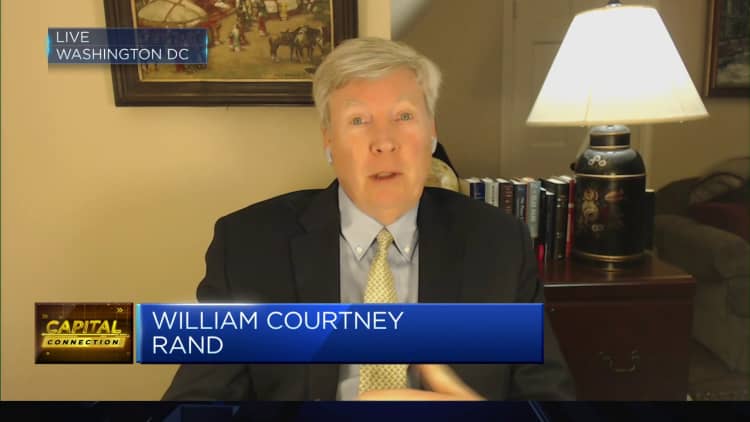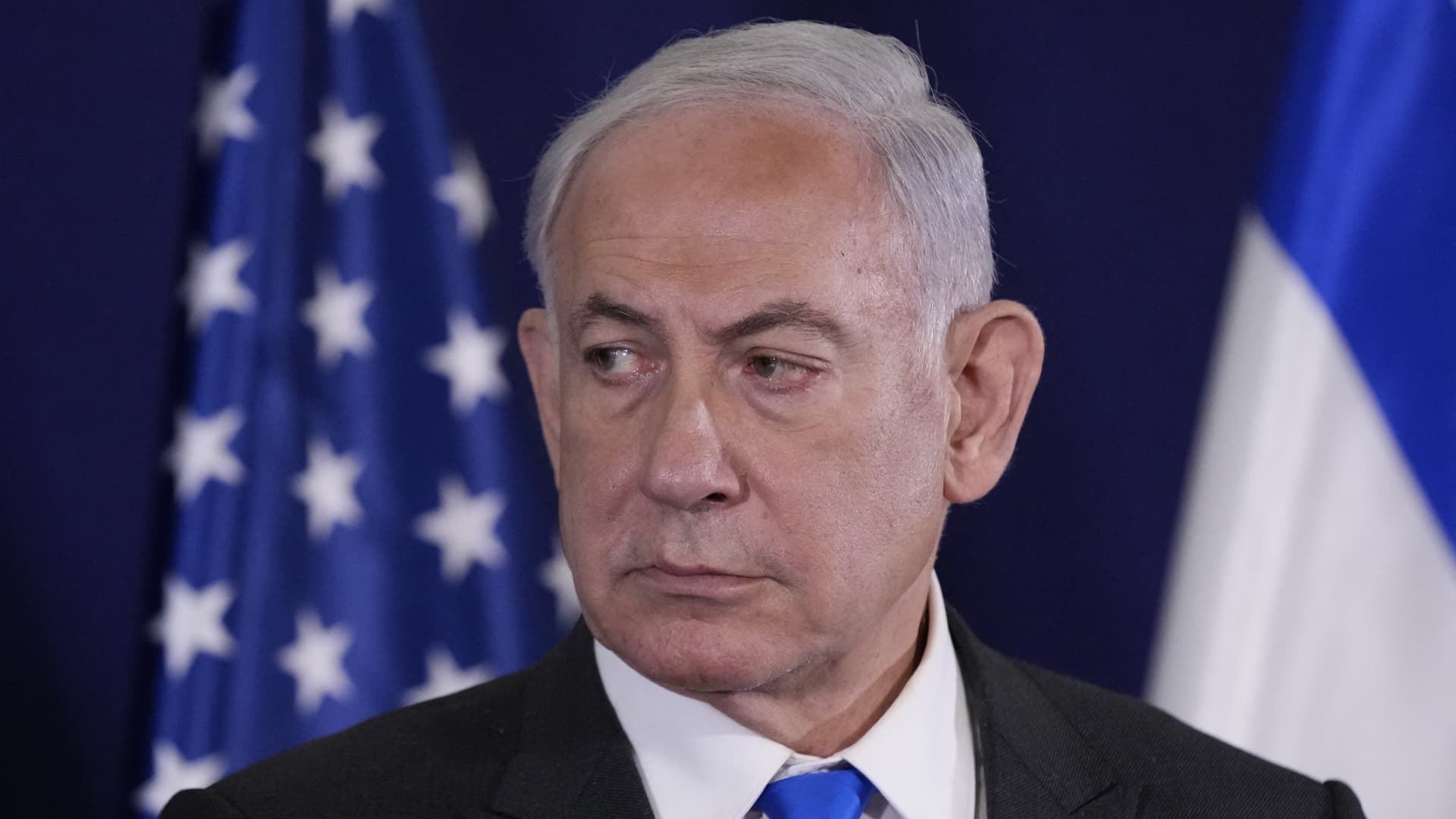Israeli Prime Minister Benjamin Netanyahu looks on as the US Secretary of State gives statements to the media inside The Kirya, which houses the Israeli Defence Ministry, after their meeting in Tel Aviv on October 12, 2023. Blinken arrived in a show of solidarity after Hamas’s surprise weekend onslaught in Israel, an AFP correspondent travelling with him reported. He is expected to visit Israeli Prime Minister Benjamin Netanyahu as Washington closes ranks with its ally that has launched a withering air campaign against Hamas militants in the Gaza Strip.
Jacquelyn Martin | Getty Images
Israeli Prime Minister Benjamin Netanyahu disclosed his first official plan for the post-war future of the Gaza Strip, calling for Israel’s ongoing military presence in the enclave and for the preservation of a security buffer zone — a step antithetical to the wishes of closely-allied Washington.
In a sparse document released overnight and translated by NBC News, Netanyahu outlines the previously stated immediate goals of demilitarizing and eradicating the governance of Hamas, as well as rescuing Israeli hostages held by the Palestinian militant group since the terror attacks of Oct. 7.
In the intermediate term, Israel wishes to “maintain its operational freedom of action in the entire Gaza Strip, without a time limit,” as well as to retain a security buffer within the besieged territory.
“The security perimeter being created in the Gaza Strip on the border with Israel will remain as long as there is a security need for it,” the document says.
The U.S., a staunch supporter of Israel’s right to self-defense and supplier of weapons throughout the conflict, has previously refuted the possibility of both a reoccupation of the Gaza Strip and a decrease in its grounds.
“There must be no reduction in the size of Gaza. That remains our position and it will remain our position. So if any proposed buffer zone was inside of Gaza, that would be a violation of that principle, and it would be something that we … that we oppose,” U.S. State Department Spokesperson Matt Miller said in December.
Israel also requests a “southern lock” on the border between the Gaza enclave and Egypt — the only stretch of land not controlled by Israel — to avoid the rearmament of “terrorist factors” among Palestinians, while the strip will be completely demilitarized “aside from what is needed to maintain civil order.”

Making no mention of the Palestinian Authority — which was expulsed after a Hamas takeover in 2007 — Netanyahu’s proposal asks for the Gaza Strip to be administered by locals who are “not identified with states or organizations supporting terror,” as well as for Israeli involvement in civilian issues, including education and religion in the predominantly Sunni Muslim territory. Any reconstruction work can only begin at an indefinite time, after these “de-radicalization” and demilitarization objectives have been achieved, the document notes.
Netanyahu also calls for the closure of the U.N. Relief and Works Agency, after accusing that some of its members were involved in the terror offensive of Oct. 7. The U.N. is investigating the claims against the agency, which has been facilitating food and resource distribution in the Gaza Strip and whose schools double as refugee shelters. After several donor countries suspended their funding following the accusations, UNRWA faces the possibility of closing down its operations by early March, an agency spokesperson previously told CNBC.
Is it unclear whether the document, scarce in detail, has been put forward for the vote of Netanyahu’s war cabinet. The proposal both appeals to the prime minister’s far-right domestic support base and also evidences the conflict between it and his administration. Netanyahu has in the past said there are no plans to reoccupy the Gaza Strip or to deport Palestinian civilians or reoccupy the Gaza Strip, while some far-right members of his government, notably Finance Minister Bezalel Smotrich, have called for the ejection of this population, according to Reuters.
The document also risks deepening the rift in views with Washington, which has supported Israel even as the nation faced scrutiny in the International Court of Justice on genocide charges levied by South Africa.
The White House has long envisaged a two-state resolution to the Israel-Hamas conflict, which has claimed 1,200 lives in Israel and over 29,000 in the Gaza Strip since Oct. 7, according to Israeli authorities and to Reuters-reported figures from the Hamas-run Ministry of Health of Gaza. This outcome would create an independent Israeli and Palestinian state, likely led by the Palestinian Authority, as well as provide security guarantees for Israel. Washington has also been doggedly pursuing a normalization of relations between Israel and Middle Eastern countries, pushing earlier this year for a reconciliation with regional ally and heavyweight Saudi Arabia.
The U.S. State Department did not immediately respond to a CNBC request for comment.
Read the original article here
